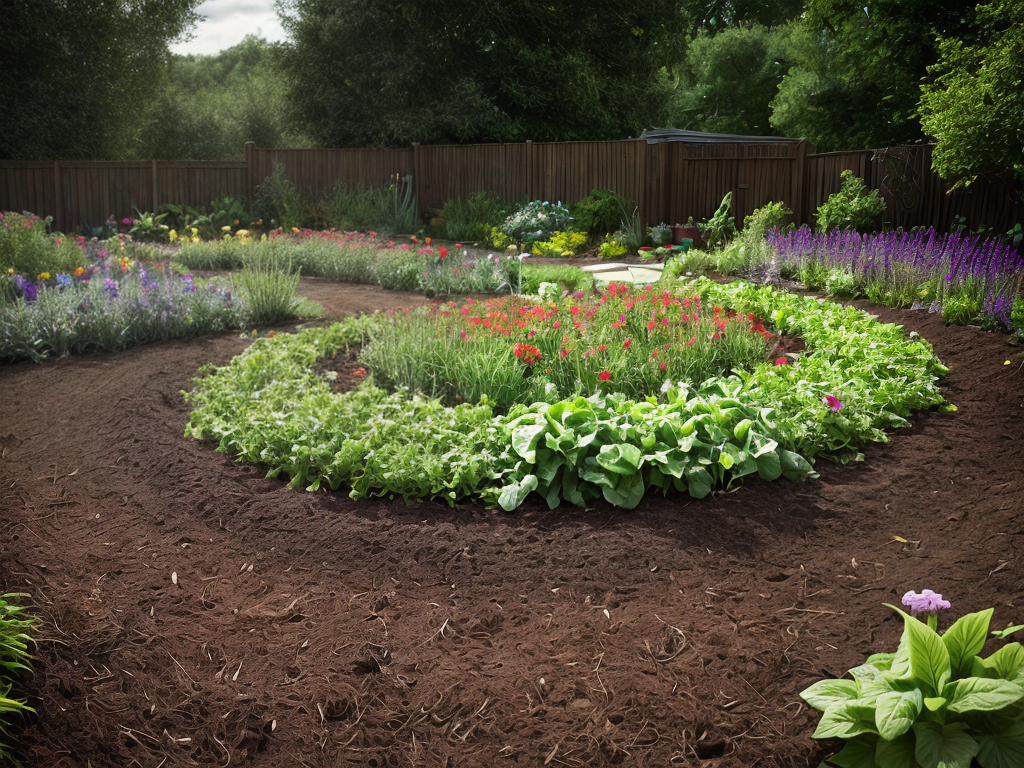
As a seasoned organic gardener, I know that preparing the soil for your veggies is like laying a sturdy foundation for a beautiful house. It’s the key to ensuring bountiful harvests and healthy plants. In this article, I will share with you the 7 best approaches to prep your soil for organic veggies. From testing and amending soil pH to incorporating compost and using cover crops, these practical tips will help you create a nutrient-rich environment for your plants to thrive.
Test and Amend Soil Ph
To ensure optimal growing conditions for my organic veggies, I begin by testing and amending the soil pH. Soil testing is crucial because it provides valuable information about the pH level, which directly impacts plant health and nutrient availability. The ideal pH range for most vegetables is between 6 and 7. If the pH is too acidic or alkaline, it can hinder nutrient absorption and affect plant growth. To adjust the pH, I use organic amendments such as compost, lime, or sulfur. Compost helps to improve overall soil structure and fertility, while lime raises the pH for acidic soil, and sulfur lowers it for alkaline soil. By regularly testing and adjusting the soil pH, I can create a favorable environment for my organic veggies to thrive.
Add Organic Matter for Improved Fertility
To improve the fertility of your soil for growing organic veggies, there are two key approaches: composting and mulching. Composting involves breaking down organic matter, such as kitchen scraps and yard waste, into nutrient-rich soil amendments. This helps to enrich the soil and provide essential nutrients for your plants. Mulching, on the other hand, helps retain moisture in the soil, preventing it from drying out and ensuring proper hydration for your veggies.
Composting for Enriched Soil
I enrich my soil by adding organic matter through composting. Composting is a simple and effective way to create nutrient-rich soil for your organic veggies. To start, you’ll need a compost bin to hold your organic waste. This can be as simple as a pile in your backyard or a more structured bin. Next, you can use a method called vermicomposting, which involves using worms to break down organic matter into nutrient-rich compost. These worms help speed up the decomposition process and create a highly fertile soil amendment. To get started with vermicomposting, you’ll need a worm bin and some red worms. By regularly adding organic waste to your compost bin or vermicomposting system, you’ll be providing your soil with valuable nutrients and improving its fertility for your organic vegetable garden.
Mulching for Moisture Retention
One effective approach for improving moisture retention and fertility in organic vegetable gardens is by mulching with organic matter. Mulching provides a protective layer on top of the soil, which helps to retain moisture and prevent evaporation. Additionally, organic mulch options can break down over time, adding valuable nutrients to the soil and improving its fertility. Here are four benefits of mulching and some organic mulch options to consider:
- Moisture retention: Mulching helps to conserve water by reducing soil evaporation, keeping the soil moist for longer periods.
- Weed suppression: Mulch acts as a barrier, preventing weeds from germinating and competing with your vegetable plants for nutrients and water.
- Temperature moderation: Mulch helps to regulate soil temperature, keeping it cooler in hot weather and warmer in cold weather.
- Soil improvement: Organic mulch options, such as compost, shredded leaves, and straw, gradually break down, adding organic matter to the soil and enhancing its fertility.
Incorporate Compost for Enhanced Nutrient Content
I love incorporating compost into my garden because it offers a multitude of benefits. Not only does it serve as a nutrient-rich soil amendment, but it also helps to improve soil structure and water retention. By using compost, I am able to practice sustainable gardening and create an environment that supports the growth of healthy, organic vegetables.
Benefits of Composting
Composting significantly enhances the nutrient content of the soil when incorporated into the preparation for organic vegetables. Here are four key benefits of composting:
-
Improved soil structure: Compost helps to create a healthy soil structure by improving its ability to hold water and nutrients. This allows plants to access the necessary resources for growth and development.
-
Increased nutrient availability: Compost is rich in essential nutrients like nitrogen, phosphorus, and potassium. When added to the soil, these nutrients become readily available to plants, promoting healthy growth and higher yields.
-
Enhanced microbial activity: Compost is teeming with beneficial microorganisms that break down organic matter and release nutrients. These microbes create a thriving soil ecosystem, improving nutrient cycling and overall soil health.
-
Reduced reliance on synthetic fertilizers: By incorporating compost into the soil, organic gardeners can reduce their dependency on synthetic fertilizers. This not only saves money but also helps protect the environment by minimizing chemical runoff.
Incorporating compost into the soil is a simple yet powerful way to improve soil health and enhance the nutrient content for growing organic vegetables.
Nutrient-Rich Soil Amendment
To further enrich the nutrient content of the soil, incorporating compost is a highly effective method. Compost is a nutrient-rich soil amendment that can enhance the fertility and structure of your soil. It contains a wide range of organic matter, such as decomposed plant material and animal manure, which provides essential nutrients for plant growth. By adding compost to your soil, you are not only improving its nutrient content but also promoting organic soil enrichment. Compost helps to increase the levels of organic matter in the soil, which improves its water-holding capacity and encourages beneficial microorganisms. To incorporate compost into your soil, simply spread a layer of compost on top and gently mix it in with a garden fork or tiller. This will ensure that the compost is evenly distributed throughout the soil, allowing your organic veggies to thrive.
Sustainable Gardening Practices
One effective approach to enhance the nutrient content of soil for organic veggies is by incorporating compost, a nutrient-rich soil amendment. Compost not only enriches the soil, but also improves its structure and water-holding capacity. Here are four sustainable gardening practices that can be incorporated along with compost:
-
Sustainable Watering Techniques: Conserving water is crucial in sustainable gardening. Practices such as drip irrigation, mulching, and using rainwater harvesting systems can help minimize water wastage and ensure that plants receive adequate moisture.
-
Companion Planting Strategies: Planting certain combinations of vegetables, herbs, and flowers together can have mutual benefits. For instance, planting marigolds alongside tomatoes can help deter pests, while growing beans with corn can enhance soil fertility through nitrogen fixation.
-
Crop Rotation: Rotating crops each season can prevent the buildup of pests and diseases in the soil. It also helps balance nutrient depletion and maintain soil health.
-
Mulching: Applying a layer of organic mulch around plants helps conserve moisture, suppress weeds, and regulate soil temperature. It also adds organic matter to the soil as it breaks down.
Mulch to Conserve Moisture and Suppress Weeds
I’ve found that using mulch is a great way to conserve moisture and suppress weeds in my organic veggie garden. Mulching benefits are numerous and can greatly improve the health and productivity of your plants. By applying a layer of organic mulch around your vegetables, you create a protective barrier that helps retain soil moisture. This is particularly important during dry spells or in hot climates where water conservation is crucial. Mulch also acts as a natural weed suppressor, preventing weed growth by blocking sunlight and inhibiting weed seed germination. To effectively suppress weeds, make sure to apply a thick layer of mulch, around 3-4 inches, which will suffocate any existing weeds and prevent new ones from sprouting. Organic mulch options include straw, wood chips, grass clippings, and compost. So, don’t forget to mulch your garden beds for healthier and more productive organic veggies!
Practice Crop Rotation to Prevent Disease and Nutrient Depletion
Crop rotation is an essential practice to prevent disease and nutrient depletion in my organic veggie garden. By rotating the crops I grow, I can maintain the health and fertility of my soil while also reducing the risk of pests and diseases. Here are four reasons why crop rotation is important:
-
Disease prevention: Growing the same crop in the same spot year after year can lead to the buildup of pests and diseases that specifically target that crop. By rotating crops, I can disrupt the life cycles of these pests and minimize the risk of disease outbreaks.
-
Nutrient management: Different crops have different nutrient requirements. By rotating crops, I can ensure that the nutrients in my soil are used efficiently and prevent depletion of specific nutrients.
-
Weed control: Crop rotation can help break the cycle of weeds that thrive in specific crops. By rotating crops, I can reduce the growth of weeds and minimize the need for chemical weed control.
-
Natural pest control: Some crops have natural pest-repellent properties. By rotating crops, I can take advantage of these properties and reduce the need for chemical pesticides.
Use Cover Crops to Improve Soil Structure and Fertility
To improve the structure and fertility of my soil, I rely on the use of cover crops. Cover crops are plants that are grown specifically to benefit the soil rather than for harvest. They offer numerous benefits, including improving soil structure and enhancing fertility. One of the main advantages of using cover crops is that they help to prevent erosion by holding the soil in place. Additionally, cover crops can increase organic matter in the soil, which contributes to improved soil structure and nutrient availability. They also help to suppress weeds and reduce the need for synthetic fertilizers and pesticides. By planting cover crops, I am able to enhance the overall health and productivity of my soil, leading to healthier and more abundant organic vegetables.
Avoid Chemical Fertilizers and Pesticides for a Truly Organic Approach
Using chemical fertilizers and pesticides goes against my commitment to a truly organic approach for preparing soil for growing vegetables. Chemical-free gardening is not only better for the environment, but it also promotes healthier and more nutritious produce. Here are four reasons to avoid chemical fertilizers and pesticides:
- Environmental impact: Chemical fertilizers and pesticides can contaminate soil, water, and air, harming beneficial organisms and disrupting ecosystems.
- Health benefits: By avoiding chemicals, you minimize the risk of exposure to harmful substances, protecting your health and the health of your loved ones.
- Soil fertility: Chemical fertilizers can deplete the natural fertility of the soil over time, making it dependent on external inputs. Organic methods, on the other hand, improve soil structure and promote long-term fertility.
- Natural pest control: Embracing natural pest control methods such as companion planting, crop rotation, and biological controls helps maintain a balanced ecosystem and reduces the need for chemical intervention.


